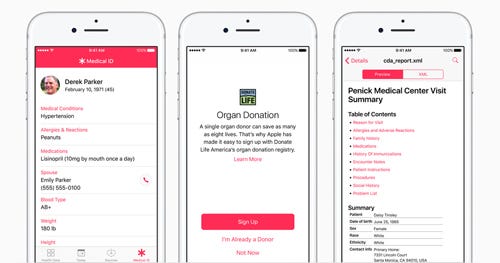Apple Has Been in Touch with FDA—a Lot and in Private
December 1, 2016
A published report indicates the agency's involvement in the development of Apple healthcare products and its efforts to keep the discussions secret.
Nancy Crotti

Apple has shared numerous confidential emails and in-person meetings with FDA over the past three years to discuss an app that would help diagnose Parkinson's disease and two separate but related cardiac devices, according to a report by MobiHealthNews.
The news site filed a Freedom of Information Act request with FDA asking for documentation of its communications with Apple, and it got a treasure trove.
The emails alone revealed discussions about reviews of the App Store and 510(k) processes, apps for Apple's ResearchKit and diagnostics, about "working with the FDA in an 'unregulated' way" and more, according to the report. The agency invited Apple to regular discussions "to help guide an international effort to harmonize medical software regulation," it says.
After Apple publicized a 2013 meeting with FDA, the agency asked that the company keep further communications on the down-low, according to the report. The emails detail some meetings that included top FDA figures such as commissioner Robert Califf and CDRH director Jeffrey Shuren, but were kept off their public calendars.
Among several other attendees at meetings over the years was Apple healthcare marketing manager Afshad Mistri, dubbed "Apple's secret weapon in a stealth campaign to get the iPad into the hands of doctors" by Wired Magazine in 2011.
Most emails include Bakul Patel, FDA's associate center director for digital health. An early one has Patel asking Apple to expand on a discussion regarding commercial platforms with sensors, and about Apple's app review process. FDA redacted confidential information from the communications it provided to MobiHealthNews, which wasn't able to ascertain the outcomes of all the meetings. One topic of discussion, Apple's App Store developer guidelines for mobile medical applications, only yielded fruit last summer. The guidelinesaddress the unique safety, privacy, and regulatory concerns of mobile medical apps.
The report also revealed that FDA asked Apple in October 2014 to contribute a representative to a working group under the International Medical Device Regulators Forum (IMDRF), agroup of medtech regulators from around the world that first met in 2013 to boost regulatory harmony and convergence on standalone medical software. This year's discussions among Apple and FDA have focused on IMDRF and the agency's regulation of Apple's Parkinson's diagnosis app and cardiac devices, the report says.
A Feb. 22, 2016 meeting involving Apple reps, Califf and Shuren, yielded an internal Apple email that says, "[T]hey are keen to work with us as they develop a new framework for regulating SaMD (software as a medical device)."
When it announced CareKit in March 2016, Apple had already lined up health and wellness organizations to use it to develop apps for Parkinson's patients, post-surgery progress, home health monitoring of chronic conditions, diabetes management, mental health, and maternal health. For example, Sage Bionetworks and the University of Rochester are using CareKit to turn the mPower ResearchKit study to inform Parkinson's patients about their condition and care providers about treatment.
Divya Nag, a special projects lead at Apple, sent Patel an email describing a meeting arranged to "discuss the telehealth/remote monitoring use case for Parkinson's and ... the diagnostic app," according to a separate reportby MobiHealth. The email said Apple wanted to know whether "there are any FDA considerations to understand before implementing."
Apple did not immediately respond to a request for comment on the emails. FDA press officer Stephanie Caccomo said this:
"The FDA encourages industry to communicate with the agency throughout the medical device review process and we frequently meet with industry representatives, including Apple and its competitors. The FDA invites app developers to contact the FDA as early as possible--if they have any questions about their mobile app, its level of risk, and whether a premarket application is required--so that regulators may provide guidance."
Nancy Crotti is a contributor to Qmed.
Like what you're reading? Subscribe to our daily e-newsletter.
[image courtesy of APPLE]
About the Author(s)
You May Also Like

.png?width=300&auto=webp&quality=80&disable=upscale)
